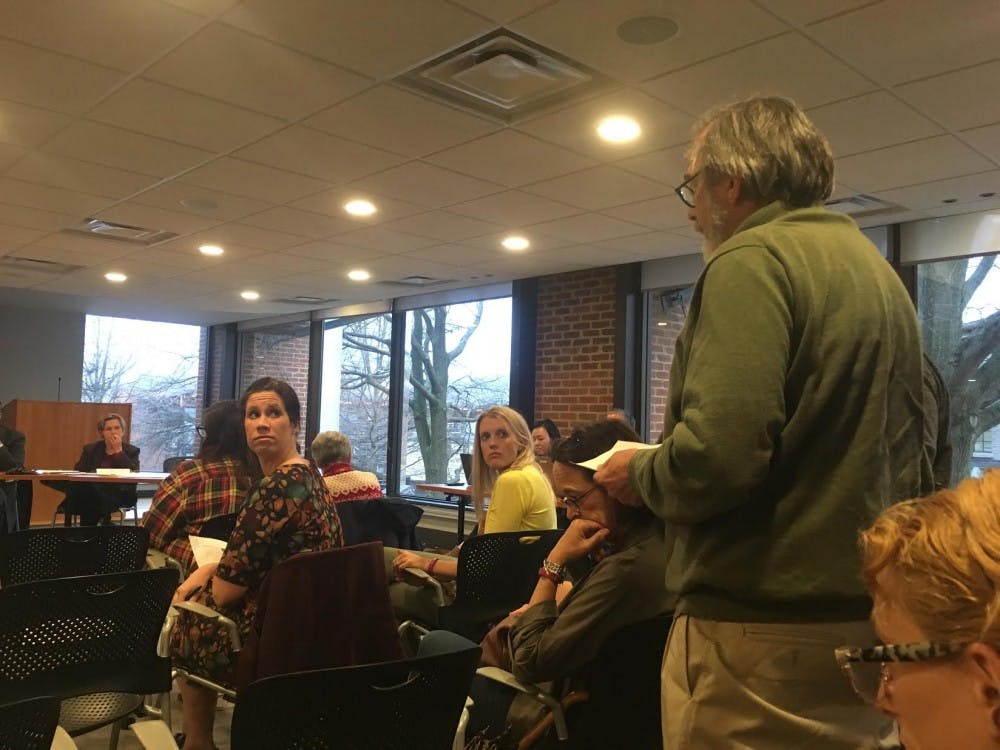The City of Charlottesville hosted a community budget forum Wednesday to elicit public feedback on the City Manager's proposed budget for the 2019 fiscal year. The City is currently in the process of developing the FY19 budget which will begin in July.
The City Council will formally adopt the FY19 budget April 10 after modifications have been made to Jones’s originally proposed budget based on public feedback and Council worksessions.
City Manager Maurice Jones began the forum with a presentation about the proposed budget thus far which includes more than $179 million — a 4.5% increase from the last year’s budget total.
“Our major themes for this year’s budget are strong support for city schools, preserving and enhancing quality services, affordable housing investment, focus on organizational efficiencies, strategic plan and council priorities, and maintaining the real estate tax rate,” Jones said.
After his presentation, Jones yielded the floor to the audience, which included members of the Charlottesville community and the City Council.
This year, $100,000 in the City Council strategic initiatives fund will be used to finance a pilot initiative in participatory budgeting. Participatory budgeting solicits input from members of the community to decide how to spend part of the public budget, allowing citizens to engage directly with the process of deciding where to allocate funds.
“This is your opportunity to talk about anything you want to, related to the budget,” Jones told the audience.
One by one, citizens stepped up to petition the City for funding for various projects including affordable housing and mental health resources for the homeless, childcare opportunities and the Human Rights Commission.
The Charlottesville Human Rights Commission serves as an advisory body to the Council regarding matters relating to human and civil rights to “advocate for justice and equality” locally.
Nancy Carpenter, the homeless prevention coordinator for the Haven — a daytime homeless shelter in downtown Charlottesville — advocated for the City to hire a well paid individual to oversee SOAR applications.
The supplemental security income/social security disability insurance outreach, access and recovery (SOAR) is a program to benefit people with mental illness, medical problems or substance abuse issues who are homeless or at risk of homelessness.
“What I advocated for first is a fully funded individual to do SOAR applications for chronically homeless individuals,” Carpenter said. “But to have them be able to have some kind of income that creates some kind of stability, still very marginal, but at least it’s better.”
Jessica Maslaney, the chief executive officer of the YMCA in Charlottesville, and Eleanor Von Achen, the mother of two children in the YMCA, advocated for the City Council to provide additional funding for the organization this fiscal year.
“Programs like the Y and the Jefferson School give people like us access to childcare when we otherwise wouldn’t have it,” Von Achen said. “We don’t know what we would do without this program. Before you make your final decisions on the budgets, I want you to decide if you are going to support all of these families, or if you’re going to leave us behind.”
Walt Heinecke, an associate professor in the Curry School, petitioned the City to allocate an additional $52,000 to the Human Rights Commission. Heinecke has advocated in the past for the City to hire new leadership for the Human Rights Commission.
Heinecke said the commission needs clear directives from the City Council and added that the current chain of command for the commission — which currently reports to the City Manager's office — needs to be altered so that the commission instead reports directly to the Mayor or the City Council. According to Heinecke, this structural change of the commission would make the body more transparent and accountable to the local community.
“A budget is the reflection of the values of a community,” Heinecke said to the Council.
“There’s no reason why they shouldn’t put $52,000 into the budget for the human rights commission, to fix it, and yet every comment that they made was a reason why not to do it,” Heinecke added in an interview with The Cavalier Daily.
Some of the speakers, such as Maslaney, felt that their requests were being seriously considered by the City Council as part of the City budget.
“I definitely think they’ve been taking us seriously,” Maslaney said. “They recommended funding if available, so we’re just here advocating for them to make that funding available. I definitely think they’ve been very receptive, we’ve been able to meet face-to-face with several of the councilors.”
However, Heinecke said the City Council was not receptive to his input.
“I think they listen, but they don’t hear,” Heinecke said. “There was no embracing of the problem or the solution that they’ve been given. There’s no political will in this Council to solve institutional racism.”
Jones said that hosting public forums was a crucial part of the City’s budget development process.
“It’s critically important that we hear from folks on what is the most important issue the city council has to make each year, how much money we’re going spend on the services that people want and need in our community,” Jones said.
Another public hearing for the City’s budget will take place on April 2.







